Mr. Bleher welcome to first discus keeper organization in Croatia. ![]()
![]()

Please introduce yourself to Croatian discus keepers.
I think instead of writing her several pages, it is better to just go to my website www.aquapress-bleher.com and read under BIOGRAPHY – for those who do not know me. Also one can go to google.com look up ‘Heiko Bleher’ (this name exists only one time on earth).
How did you become what You are now? Where did that love and desire for exploring came from?
I was born into it, comes from my Grandfather (Adolf Kiel), followed by his daughter Amanda Flora Bleher) and my mother took me with 4 to Central Africa, and with 7 to South America, where I in part grew up in the deepest jungle, living with Indians and leaning from them as well, spending almost 2 years in South America with our mother.
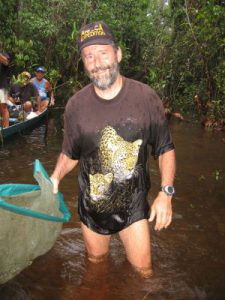 You wrote a lot about genus Symphysodon. What can you tell us, why is that genus so special and why is the king of aquariums?
You wrote a lot about genus Symphysodon. What can you tell us, why is that genus so special and why is the king of aquariums?
The species of the genus Symphysodon are the most majestic fishes for any aquarium, they are peaceful, flat as a disc, many (wilds) have amazing colours and have, since people found out how, been easy to breed. And have, as almost no other known fish on earth and amazing and unique reproduction method: the larvae and baby fishes feed for weeks (month) on the mucous the parent animals produce for their babies, like mothers produce milk for their newly born… Because of this uniqueness, and being a perfect and extremely decorative aquarium fish they had to become ‘King of Aquarium Fishes’ or better ‘King of the Amazon’, where they originate form.
You have researched discus natural habitat, which area has most discus fishes?
This is very difficult to say, but in general the central Amazon basin affluent and lake areas (not in the main river), is the place where most in nature can be found. Naturally very rich in biomass are the places I discovered and made people aware of, like: (in this order) Tocantins basin (Browns); Alenquer region (Brown and Blue Discus variants, also reds), and that includes such lake areas as Cupeuá, Curuai, Curuá, etc.; Nhamundá region (Brown, Blue, Royal Blue, Snake Skin, et.) and Rio Nhamundá (Heckel Discus); Uatumã (Brown and Blues, Royal Blues), and Jatapú (Heckel Discus); Abacaxís and Marimari (Heckel Discus); Maués (Brown, Blue, Royal Blue), Rio Negro system (only Heckel Discus with one exception); Manacapuru region (Royal Blue, Blue and Brown); and the entire Purus region is very rich in Blue and Royal Blues. From the Coari region start the Green (red spotted), species, I found them throughout the Japurá region, Tefé (lake and River); Jutaí and Amaturá, and Japurá region; in the lake Amanã area I found Blue and Green Discus very close, etc.
In which area you find most various discus variants?
I found most variants in the Lake Nhamundá region, the fish they call today Snake Skin, the Blue, Royal Blue, Rosé, Brown, and everything in between.
[sz-youtube url=”http://www.youtube.com/watch?v=pbEY2PaMhMA” /]
What you can recommend for those who wants to keep discus fishes but they have fear because they read discus fishes are hard to keeping?
The Discus is very easy to keep fish and if one follows certain rules one can never go wrong. The problem is only, that people (mainly today), believe they can find the answers in the Internet, which is terrible, as there is everyone writing everything and millions of wrong information’s from people who just started, have no experience, but think they know it all. And because of these miss-information and people loosing discus all over the world by the millions, I have taken a life-time to write my books with practical experience from more than 5 decades, keeping millions of Discus (for over 30 year I had and shipped over 30,000 discus monthly to 86 countries worldwide). I wrote in my volume 2 of BLEHER’S DISCUS (which is the entire history from 50 countries as of how breeding started and 700 breeders are interviewed), only about 7 pages with photos (the entire book has 672 pages and 4000 photos): recommending how to get, which and where Discus, and how to keep and breed, etc. I CAN GUARANTEE, IF ANYONE FOLLOWS MY ADVICE WRITTEN DOWN ON THESE 7 PAGES STRICTLY, ONE WILL HAVE NEVER A PROBLEM WITH DISCUS. One has to just follow a few simple rules, not written anywhere else, not in any book, nor in the www, simply because not a single living or dead person has had so much Discus-experience as I have.
You said on your lecture in Zagreb, that you recommend sand with discus fishes. What is the benefit of sand and do you recommend it for wild and tank breed or just for wild discuses?
Simple because Discus are also Cichlids, and most cichlids are found over sandy grown, if in North-, Central, or South America, in Africa, Asia or Central Asia. They need to take it in and filter it out, it is in their gene. And even still in long-time tank bred ones. It is something which keeps them active, healthy and what they always look for…
Some of breeders on the east produce (bulldog,heart etc..) variants of discus, what you think about that?
I think many people by now know that I am against deformed Discus (and other fishes), which are a result of in-breeding, and/or particular breeding process to breed deformed (I call these crippled) fishes, as you said ‘Bull dog’, Butterfly, Heart-shape, Finless Discus, etc. This is a cruelty to the animals, and like under German and some other country (animal)laws is a crime and punished with high fine. But besides this it is not nice, and no one can tell me that this is beautiful, than one has very weird taste (or does not know any better). Any such deformed fish should be eliminated, or just not continued to keep and definitely not to breed on. We humans can NEVER in our short lifetime improve nature. What took nature to develop to perfection during millenniums (millions of years, in some cases hundred million years), man cannot do in 50 or 100 years – NEVER.
Some of us follow your work, on which one research you are most proud?
Very difficult to say. I am very happy in what I do, and I hope I can help people around the world with my work, my writing and publications (of which yes I am proud off, as no one will ever do/write or publish anything similar – ever, no one can make money with such monumental work, and hardly anyone will do the research I did during the last 6 decades, and no one has had a life I was fortunate to have). And it makes me proud when I see that whole villages profit from my discoveries, by doing sustainable collections (instead of burning down forest or cutting it down to sell the wood for having an income). In the Discus-world one can see it with what Hudson Crizanto is doing now (stepping in my Discus-footsteps), but I have done it with fishes in over 50 countries where people today profit from my discoveries, and naturally millions around the globe who sell those and the fish-lover who keep them. By far over 6000 different fresh- and brackish water species I discovered (or re-discovered) and introduced worldwide, to breeders, aquarist and fish-lovers, to Institutions and Universities, to Public Aquaria and Science as well. As you know some of the most popular aquariums fishes bear my name.
You are the owner of Aquapress Bleher what you can say about that?
Please read about it on my websites: www.aquapress-leher.com; www.aqua-aquapress.com or on Facebook under Aquapress-Heiko Bleher and Aqua, International Journal of Ichthyology.One can also read the story in my Bleher’s Discus volume 2.
There is big interest for your books and magazines by aquarists, why is that so?
Because no one (NO ONE) does (or will ever) do anything similar. And because my books will stay, certainly for generations to come. You can simply go to amazon.com the biggest bookseller on the globe, and can find almost any book published (unless just printed), and can see that it is available from second hand, used, or what ever for lower prices (and lowest), but you will NEVER find one of my publications second hand…
Which discus show is the greatest event on the World?
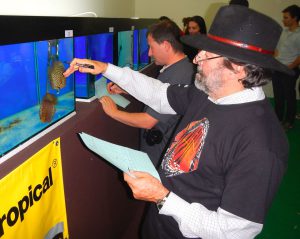 It was in 1989, 1991 and 1993 AQUARAMA in Singapore, which I did the coordination for the greatest Discus Show and Contest. (After that the event was sold and since than went down-hill, the new organizers were not fish, and much less Discus people). Than I helped and coordinated 100% the International Discus Championships in Duisburg Germany (1996) and it went from my 600plus Discus in Contest to less than 300, when the organizer stopped. Since than the biggest may be (but certainly not the best), the Aqua Fair in Malaysia, which is done not on a regular basis. And maybe the one organized by the Malaysia Discus Society and the one by the Discus Society Singapore. All of those have in average 200- 300 Discus in Contest, but exclusively from Southeast Asia and many today with deformed Discus in competition… So there is no more ‘greatest’, simply as there are so many now (in about 15 countries between yearly and every 3 or 4 years). Maybe The yealy Shaquaria, which I am heading as judge from the begin 6 years again, is quality-wise the best.
It was in 1989, 1991 and 1993 AQUARAMA in Singapore, which I did the coordination for the greatest Discus Show and Contest. (After that the event was sold and since than went down-hill, the new organizers were not fish, and much less Discus people). Than I helped and coordinated 100% the International Discus Championships in Duisburg Germany (1996) and it went from my 600plus Discus in Contest to less than 300, when the organizer stopped. Since than the biggest may be (but certainly not the best), the Aqua Fair in Malaysia, which is done not on a regular basis. And maybe the one organized by the Malaysia Discus Society and the one by the Discus Society Singapore. All of those have in average 200- 300 Discus in Contest, but exclusively from Southeast Asia and many today with deformed Discus in competition… So there is no more ‘greatest’, simply as there are so many now (in about 15 countries between yearly and every 3 or 4 years). Maybe The yealy Shaquaria, which I am heading as judge from the begin 6 years again, is quality-wise the best.
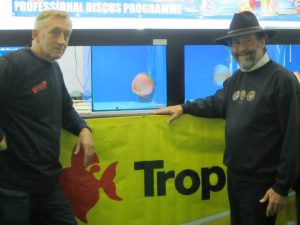 You have visited Croatia last year and held some lectures and judged the first Croatian discus championship, what is Your comment about the interest for those two events? What do you think about Croatian discus scene?
You have visited Croatia last year and held some lectures and judged the first Croatian discus championship, what is Your comment about the interest for those two events? What do you think about Croatian discus scene?
Sorry I really don’t know much about it, except for judging last October in Zagreb. There were some very nice discus, but I think almost all come from outside of Croatia. I whish and hope (and will help as much as I can), that it will grow. At least one excellent breeder you have, and it is in my volume 2 immortalized. But I was fortunate to meet another two or three last October and I can see that it is growing, although I think like in Macedonia it is even stronger, the interest. If people are willing to learn (and not from the www), I am sure it has great potential, as the fish-lover-community in Croatia is fantastic, great and most of those I meet are young people.
Which is your favourite variant of discus fish and why?
Any wild discus, actually every natural fish is my favourite, as everyone has something special, no matter what, one just has to look carefully.
Beside this questions, do you have something to add what you think is important for discus keepers and breeders?
THINK FISH
And on the end of this interview, would You do us an honour to became our honorary member No.1?
I am very honoured, thank you very much and give my kindest regards to everyone, and I end with the words: This hobby is not only the most beautiful, but also the most educational hobby we have and know, and if done biotope-correct, one can have more joy and more relax and tranquillity – and learn – as from any TV-set…
Mario Bogdan, Držislav Krasić, Igor Grginov
Photo by: Facebook
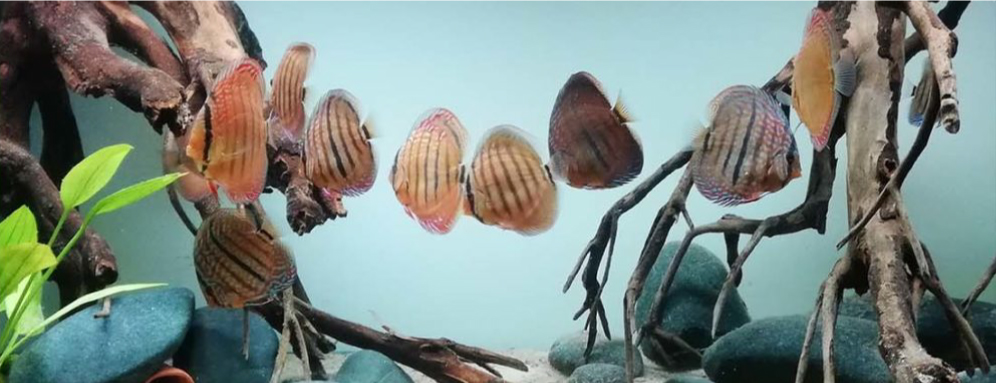


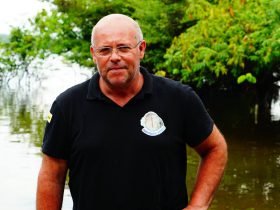


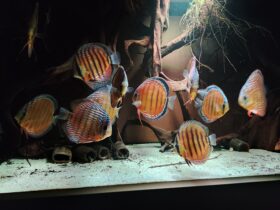






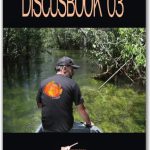
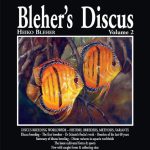
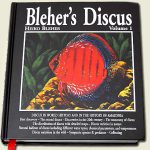





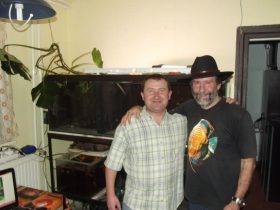


Ostavi Recenziju